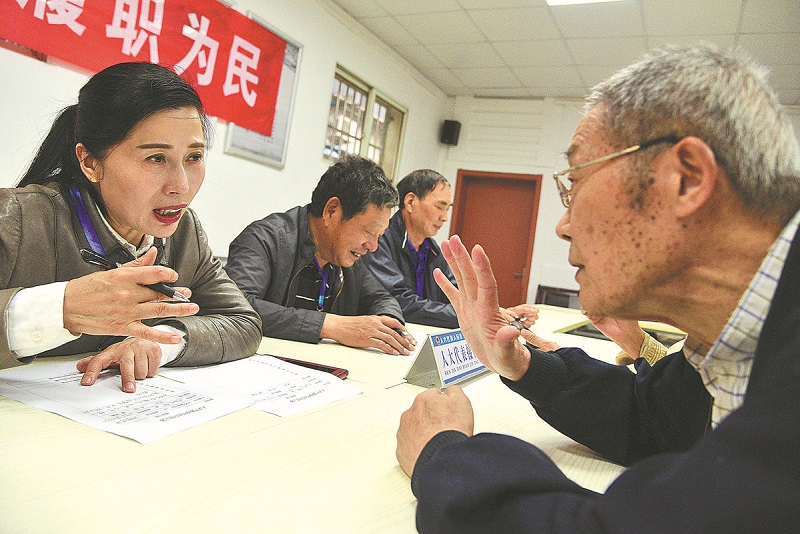Experts laud merits of China's democracy

Local deputies to the National People's Congress listen to the opinions and suggestions of voters in Zhenjiang city, Jiangsu province, in May last year. SHI YUCHENG/FOR CHINA DAILY
Encouraging voters
Both the NPC and the CPPCC will begin new terms in March. During the current round of term changes, more than 2.6 million new deputies have been elected to people's congresses in townships and county-level regions in China, following the conclusion of elections that began in the first half of last year. Nearly 150,000 more deputies were elected this time than in previous elections.
The base numbers of deputies to people's congresses at township and county levels have both been increased to boost participation in politics.
According to statistics, 921 million voters, accounting for 86.49 percent of registered voters, cast their votes in the election of county-level people's congress deputies. Meanwhile, 623 million voters, accounting for 85.63 percent of registered voters, voted in the election of deputies to township-level people's congresses.
Above all this, the congresses have built a multilayered system to connect with citizens at the grassroots level. As of last month, the Legislative Affairs Commission of the Standing Committee of the NPC had set up 32 neighborhood contact points, covering all provinces and cities nationwide. Cities and districts also set up over 5,500 contact points.
In Shanghai's Hongqiao, where Xi first explained China's whole-process people's democracy, about 1,300 opinions and suggestions related to 67 laws have been collected and reported since the contact point was established seven years ago. Among them, 101 suggestions have been adopted by the NPC.
In Hunan province last year, the voting system for deputies on livelihoods achieved full coverage of 1,524 townships and was piloted in 26 county-level people's congresses. In Longshan county, a special industrial road 10 kilometers long was built after it was voted for by deputies.
Wijaya said one aspect that sticks out in the consultation process is how active the CPC is in obtaining public opinion.
"As a lawyer, I believe this is crucial since the rule of law only functions effectively when it accurately reflects the desires of the rational population. One illustration is the fact that whenever China intends to enact a new law or regulation, there are several drafts that are released to the public in waves," said Wijaya, who is also an associate at Christian Teo & Partners, a corporate and commercial law firm in Jakarta, Indonesia.
"Despite the volume of public feedback obtained, the CPC moves quickly to transform it into practice and generate the law or regulation. I commend the CPC for its efficacy and efficiency in putting whole-process democracy into practice," he said.
Benefiting all of society
For Sayed, this integrated democratic process not only benefits the electoral process but society as a whole.
He said what stands out is "the ability of the largest political party in the world, the CPC" to have a "very cohesive disciplined and merit-based system of delivery" — from the prefecture level to the township level, from the city to the province, and to Beijing — as well as a coordinated response mechanism.
"And you can see that when the earthquake in Sichuan province happened (in 2010), you can see how the CPC was mobilized and the rescue efforts and rehabilitation efforts were done promptly and with high effectiveness," Sayed said.
"So we can see… the Party system delivered very effectively, and the people of China have been given a better life."
Now, the CPC and China as a whole have come to another crucial moment for national rejuvenation. The 20th CPC National Congress "is historic and very important to renew the vigor of China's leadership and to strengthen the pace of reforms in a very unstable and problematic world environment," Flores said.
He added that the weak global economy "now needs a strong, courageously reformist and dynamic China" as a catalyst for world economic recovery and also as an anchor for stability.
Sayed said, "When we talk about governance or when we talk about democracy … when we talk about different models of governance, the end game of all models of governance and the purpose is to deliver to the people to make sure that the people of that nation-state or of that country are taken care of and their lives are made better.
"That is the end game, the purpose or the objective of every governance model."
Xinhua contributed to this story.
- China's top legislator holds talks with speaker of Zambia's National Assembly
- China's top legislator meets Finnish president
- Lawmakers to meet early next month to deliberate draft laws, reports
- Senior Chinese legislator meets Ethiopian guests in Beijing
- Senior legislator solicits opinions on revisions to education laws



